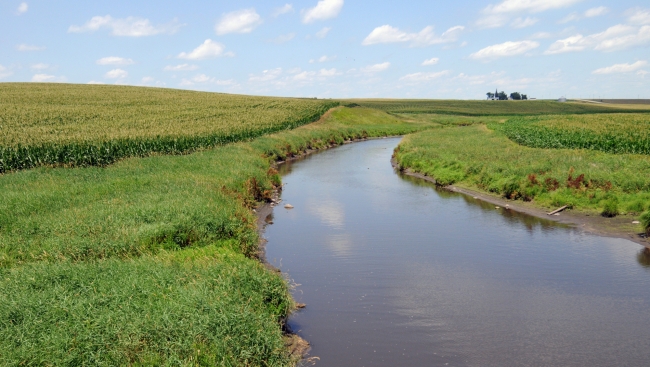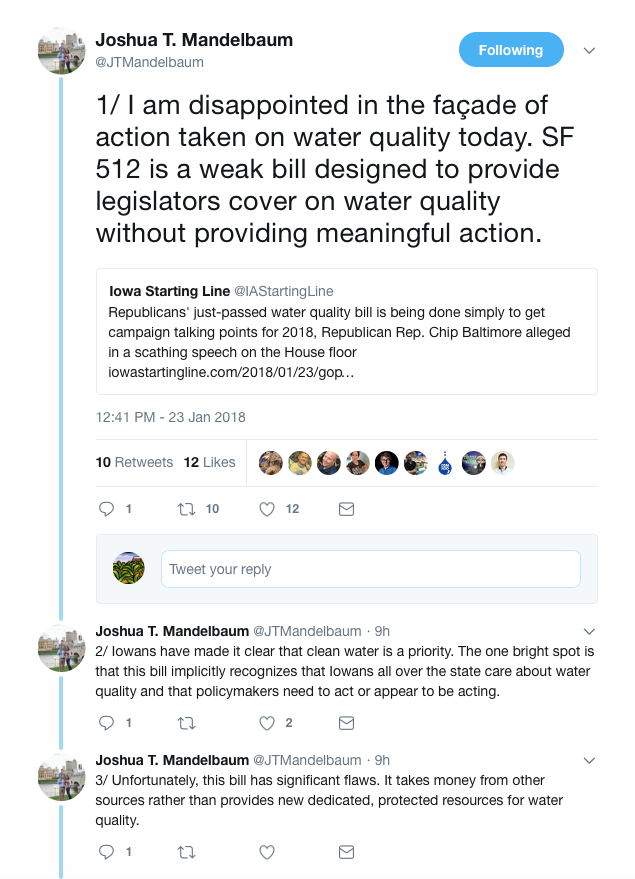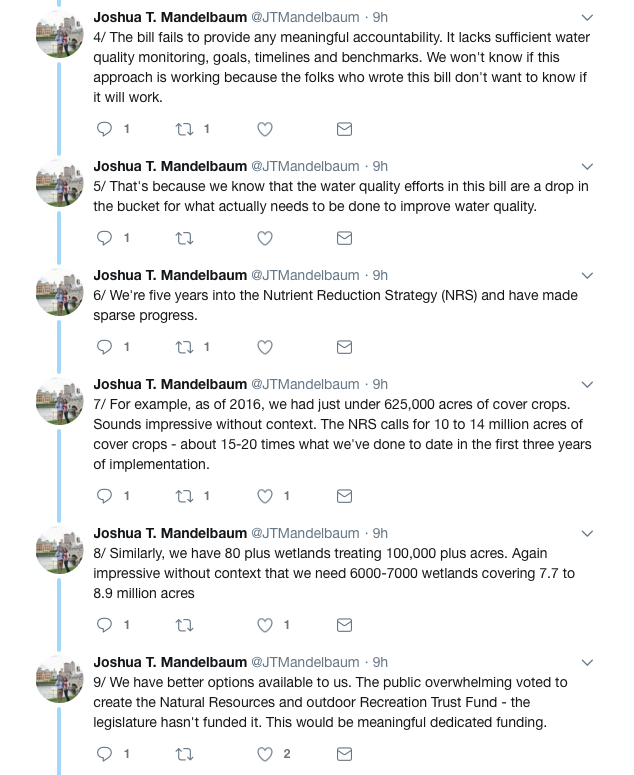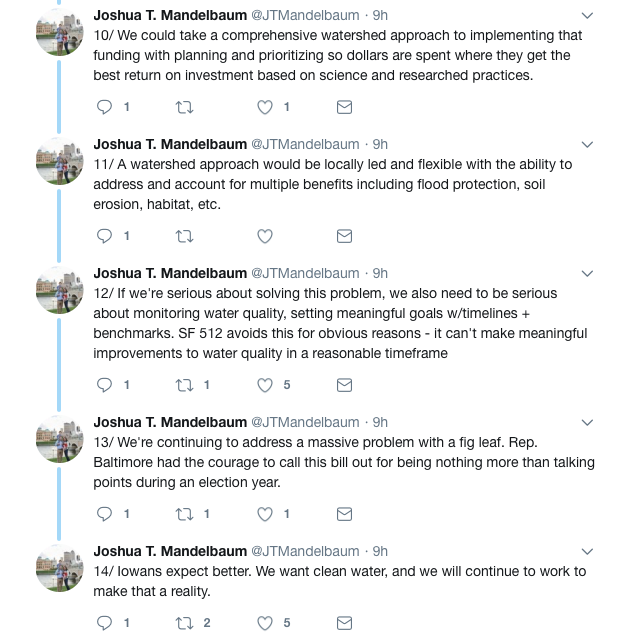Iowa House Republicans capitulated on January 23, sending the Senate’s version of a bill to fund water programs to Governor Kim Reynolds’ desk. During the floor debate on Senate File 512, several Democrats and Republican State Representative Chip Baltimore argued for the water quality language House members had approved last year with strong bipartisan support. Whereas agricultural lobby groups were the primary supporters of Senate File 512, a large number of stakeholders were involved in crafting the House amendment. Insisting on the House version would have sent the legislation to a conference committee for further negotiations. All 41 House Democrats and five Republicans (Baltimore, Mary Ann Hanusa, Jake Highfill, Guy Vander Linden, and Ralph Watts) opposed “receding” from the House version, but the other 54 Republicans approved the motion to abandon that language (roll call).
The subsequent 59 to 41 vote to approve final passage of the Senate bill mostly followed party lines, but four Democrats who represent smaller towns and rural areas voted yes: Bruce Bearinger, Helen Miller, Scott Ourth, and Todd Prichard. Miller has taken a particular interest in farm-related issues over the years; she is the Agriculture Committee Chair for the National Black Caucus of State Legislators as well as a member of State Agricultural and Rural Leaders.
Four Republicans joined the rest of the House Democrats to oppose Senate File 512: Baltimore, Hanusa, Highfill, and Vander Linden. As floor manager of this legislation in 2017, Baltimore led a group of GOP House members who opposed the Senate’s approach. More recently, he was sidelined as the Iowa Farm Bureau and allies pressured the “Baltimore 16” to accept the Senate bill without amendments. Appearing on Iowa Public Radio’s “River to River” broadcast on January 22, Baltimore sounded discouraged, saying there was a “snowball’s chance in hell” of a water quality compromise. His final words on that program called for “reasonable minds” to get something “comprehensive and collaborative done, rather than shoving one bill down another chamber’s throat and promising to work on it later.”
New floor manager John Wills promised passage of Senate File 512 would be “just the beginning, not the end” of legislative discussions on water quality. No one I know in the environmental community believes Republicans will approve any further funding increases for water programs, much less a bill that would measure progress so the public could find out what methods work best to reduce water pollution.
I enclose below some of the best takes I’ve seen on the worse-than-doing-nothing bill Reynolds will soon sign.
“AN IRRESPONSIBLE USE OF TAXPAYER FUNDS THAT GIVES NO ASSURANCE OF ACTUALLY CLEANING UP OUR LAKES AND STREAMS”
The non-profit Iowa Environmental Council, which unites dozens of organizations concerned about protecting natural resources, released this statement after yesterday’s House vote.
The Iowa Environmental Council (IEC) is disappointed by the passage of SF512 in the House today after only 40 minutes of debate. “Our legislature today chose a failed business-as-usual approach to cleaning up our polluted lakes and rivers”, according to IEC Executive Director Jennifer Terry. SF512 is a missed opportunity—lacking a collaborative approach to crafting legislation that protects the health and safety of Iowans. “The legislation passed today lacks a scientifically-proven watershed approach, lacks funding for adequate financial and human capital, lacks required water quality monitoring or assurance of public access to data about Iowa’s water quality,” Terry said.
Citing SF512 as an irresponsible use of taxpayer funds that gives no assurance of actually cleaning up our lakes and streams, Terry is concerned that legislators will ‘check the water quality’ box and fail to revisit the shortcomings of this bill. “Where are the voices of environment, habitat, conservation, watershed planning, public health and sustainable agriculture in this process and in this bill?” Terry asked.
In 2017, a diverse group of entities opposed this legislation. Iowa Environmental Council member organizations such as Citizens for a Healthy Iowa, Des Moines Water Works, Environmental Law and Policy Center, the Iowa Farmers Union, Iowa Rivers Revival, the Izaak Walton League and the Raccoon River Watershed Association all stood in opposition of SF512. “These groups did not just say “no,” but provided a wealth of resources and real solutions that would have resulted in effective policy. Today, Iowa’s legislature chose to ignore these common-sense solutions and the voices of the Iowans who are represented by these groups,” Terry said. […]
Iowans have the right to clean, safe water. Iowans have a right to use their public beaches that are all too often polluted with bacteria and blue-green algae from nutrient pollution. “Our members want to see a bipartisan water quality bill that includes a scientific watershed approach, locally-led, science-based watershed planning, sustainable and adequate funding mechanisms and monitoring with public access to data, Terry said. “We call on the Governor to urge lawmakers to consider the voices of their fellow Iowans and take real, meaningful steps to cleaner water.”
For anyone wanting to understand the differences between the House and Senate water quality proposals, Iowa Environmental Council staff compiled the best side-by-side comparison I have seen. The more you delve into the details, the more Senate File 512’s deficiencies are clear.
“ANOTHER REPUBLICAN ‘BAIT AND SWITCH’ IN THE MAKING”
For more than a decade, State Senator Rob Hogg has been one of the legislature’s strongest advocates for good environmental policies. The Des Moines Register published his commentary on January 1 under the headline, “Iowa needs real action for water solutions, not GOP facade.” I encourage you to click through and read the whole piece. Excerpts:
After cutting millions from many water programs, their current water proposal (Senate File 512) calls for spending up to $27 million a year for unspecified water projects beginning in 2021, with the funding coming from sources currently used for schools, local governments and building infrastructure.
This proposed spending would all be subject to the budgeting whims of a future legislature; it is another Republican “bait and switch” in the making.
Senate File 512 sets no goals. It establishes no watershed management governance. It does not target high-priority watersheds with the state’s investments in water.
The bill does call for annual reporting, but only of the expenditures made, not the results obtained. It calls for a “program review committee” that would not meet until Sept. 1, 2027, and then only every 10 years. […]
In addition to providing dedicated revenue sources, water legislation should:
• Set short- and long-term goals for reducing water pollution and improving flood and drought preparedness.
• Create a new “Iowa Water Commission” to pull together all federal, state and local agencies working on water issues, including the Leopold Center for Sustainable Agriculture at Iowa State University, which had its funding stripped.
• Direct the Iowa Water Commission to prepare actionable five-year plans with new dedicated funding (like the Iowa Transportation Commission does).
• Provide more financial support for flood and drought preparedness infrastructure and practices in cities both large and small.
• Re-establish and improve measuring and monitoring programs and provide timely reports to the public that focus on results, telling us our return on investment.
• Strengthen the role of cooperative watershed management authorities to act on water quality and water quantity challenges.
• Update the master matrix and improve manure management plans and compliance to better protect our watersheds.
• Ensure “conservation compliance” standards for those receiving public funds through soil and water quality programs.
• Expand ongoing research into better management practices for urban and rural landowners.
In a statement released on January 23, State Senator Bob Dvorsky, the ranking Democrat on the Senate’s Natural Resources and Environment Committee, echoed Hogg’s analysis.
“Water quality is a real problem that deserves a real solution. Senate File 512 is not a real solution.
“This bill fails to ensure accountability through monitoring to measure whether the state is achieving the goal of cleaner water and healthier soils.
“This bill falls also short because Republicans failed to work in a bipartisan manner and failed to seek input from farmers, environmentalist and other concerned Iowans. A bipartisan approach would have produced a better bill that would have been effective at addressing this serious issue.”
“WE CAN’T PROMISE TAXPAYERS THAT WE’RE GOING TO GET RESULTS”
Many Iowa lawmakers care deeply about the environment, but no one in the House has worked harder on those issues in recent years than State Representative Chuck Isenhart, the ranking Democrat on the Environmental Protection Committee. So while several House members delivered good speeches during the January 23 floor debate (you can watch them all here, starting at the 9:50:00 mark), I’d most recommend Isenhart’s.
Isenhart began by outlining a principle that should inform legislative efforts: “Iowans are willing to pay for results if we know we are getting the results we are paying for.” He recognized Baltimore for his leadership and hard work on crafting a bipartisan bill. “We didn’t get everything we asked for–I certainly didn’t get everything I wanted,” Isenhart noted. Still, they got 79 votes “for a water quality bill that I think would have put us on the path of Iowans getting results for what we’re paying for. Some of those amendments addressed goals, timelines, measurement, monitoring of water quality in stream, public reporting of results. All based on initiatives undertaken at the watershed level with the potential for all contributors to the problem working together to put their shoulders to the wheel collectively […].”
Knowing how much effort went into the House compromise, Isenhart added,
I’m very disappointed, not only for ourselves, but for you, Representative Baltimore, that your colleagues seem now to be so willing to simply discard all the hard work we did last session, and simply say a bill that we thought was not good enough is now good enough. Although we just heard what I consider a vague promise of more, well, why don’t we see the more and vote on that first, and then come back to this?
The promises reminded Isenhart of the old television game show “Let’s Make a Deal.”
Well, we’re told today that we can have what’s under box number 1 and maybe we can get what’s behind curtain number 2 also. But we don’t know what’s behind there, and I’m not sure that we’ll like what we see behind there, and I don’t know if we’ll ever get an opportunity to get what’s behind there. So I think these vague allusions about what more might be coming really aren’t relevant to today’s discussion.
Also disappointed, Representative Baltimore, that over the interim we heard from a number of stakeholders who are advocates of the Senate’s version of this bill, who have grossly distorted our work, grossly distorted what it does, in order to build up local pressure on us as individual legislators to take what I consider a watered-down water bill.
And by the way, Representative Wills, Democrats, I’m sure, would be happy to engage in those discussions. I wasn’t approached, I’m not sure Representative Prichard was approached during the interim to talk about some of these ideas. But again, if we want to keep the bipartisan approach that we’ve established here in the House under Representative Baltimore’s leadership, I’m sure we’d be interested in being part of those discussions.
Another reason for concern, Isenhart argued, was that the state’s “budget situation has materially changed” since last session. Lawmakers have to “figure out how to pay back a debt on last year’s budget” and “make significant cuts to this year’s budget,” then “figure out where we’re going to come up with the money for next year’s budget.” The legislature might pull money back that the state had promised to local authorities years ago. “So I’m not sure that we can afford even the Senate version now, given the fact that we can’t promise taxpayers that we’re going to get results, so that they can see what they’re paying for.”
He wrapped up by warning his colleagues, “we’d be letting Iowans down in the most unfortunate way” by receding on the House amendment.
“IT IS A FAILURE OF LEADERSHIP,” AND “IT LACKS INTEGRITY TO GO BACKWARDS”
Baltimore rose near the end of the House debate and had unusually harsh words for his Republican colleagues.
.
My partial transcript:
I don’t know about all of you, but I did not come down here to check a box. Just because water quality–the words “water quality” are in the title of a bill does not make me proud to vote for it so that I can put it on a postcard when I go campaign.
It befuddles me, quite honestly, to understand and comprehend what kind of leadership we are showing Iowa by receding from a wildly bipartisan bill […] that was collaborative in nature, inclusive of all of the, most all of the interested parties who wanted to do something positive for water quality, and would instead recede. And maybe that’s really a good word: recede. Because as I look at the word “recede,” it means go backwards.
We are prepared, apparently, to recede from a bipartisan, positive amendment, put it that way, to a Senate file, that to be perfectly blunt, as I was told by the chairman of the committee that ran the Senate file [State Senator Ken Rozenboom] in the Senate, the Senate didn’t really care about water quality in the first place. It was not their priority last year.
This is indeed a recession in terms of policy. I don’t consider that to be leadership. And to be perfectly blunt, the tactics that were used to get us to this point lacked integrity.
I will be very, very frank, as you all know I tend to be. I can’t stand seeing my name up on that board, above the recession motion. The motivating group and factors and tactics behind this motion [an apparent reference to the Iowa Farm Bureau] are doing a disservice in my opinion to the farmers of the state of Iowa.
The amendment H-1440, which really was the House water quality bill, was designed to make sure that all Iowans had a vested stake, not only in identifying the problems of water quality in this state, but also improving them. By receding from that amendment and going back to the original Senate file, Senate File 512 in my opinion lays water quality and the problems and solutions for water quality squarely at the feet of Iowa’s farmers. That is a disservice to them. I am sorry to the body that we were not able to achieve the objectives of the House bill last year. […]
As we sit here and listen to the debate and listen to the public statements of many others, what I hear and what I have heard for the last eight months is, “Let’s vote for the Senate bill, and we’ll keep working. We’ll keep working. We’ll keep working.” Well, where the heck have you been the last eight months, in terms of putting together the ideas that you wanted to work on to this point in time? There is no excuse, none, for not having those worked out, that could instead be put into a conference committee on this particular bill, and we could pass it and get it done.
The only excuse, Baltimore went on to explain, came up in the past week, as some Senate Republicans indicated they might be willing to do more work on this issue later in the session. Baltimore said he had no doubt Wills is a “good man” acting in “good faith.” He doesn’t trust the intentions of senators, though: “if it wasn’t a priority to them last year, why the heck would it be a priority to them now? I will literally be shocked if any substantive bill comes out of this session in terms of improving Senate File 512. Because if it could have been done, it would be being done right now. There’s an organization that doesn’t want that to happen, so I would be shocked if it does,” Baltimore added, in another apparent reference to the Farm Bureau.
In closing, he said, “I will be voting ‘no’ on this motion to recede, because I think it is a failure of leadership, and I think it lacks integrity to go backwards.”
A source in the chamber told me that as Baltimore spoke, House Speaker Linda Upmeyer looked like she was “shooting daggers” at him. The two GOP lawmakers reportedly do not get along, as Bleeding Heartland discussed here.
“WE’RE CONTINUING TO ADDRESS A MASSIVE PROBLEM WITH A FIG LEAF”
Des Moines City Council member Josh Mandelbaum posted the following tweet storm shortly after House members approved Senate File 512 on January 23. He has been deeply engaged in water quality policy-making and litigation as a staff attorney for the Environmental Law & Policy Center’s Iowa office.
FINAL THOUGHTS
Reynolds talked up the bad bill in a January 23 news release.
“I am proud that the first piece of legislation I will sign as governor will be a water quality bill,” Gov. Reynolds said. “This will go a long way towards our goal of providing a long-term, dedicated and growing revenue source to help fund and scale best practices through the already successful Nutrient Reduction Strategy.”
“As I said in my Condition of the State address earlier this month, improving water quality is a shared goal of Iowans,” she continued. “Many stakeholders – both rural and urban – played a key role in supporting this legislation and reaching a consensus.”
“But make no mistake. Passing this long-awaited legislation does not mean the water quality discussion is over,” the governor concluded. “It should ignite a continuing conversation as we begin to implement and scale best practices that will continue to make an impact on water quality in Iowa.”
As explained above, Senate File 512 is in no way a consensus. Republican senators drafted the legislation in consultation with the Iowa Farm Bureau and other agricultural lobby groups, excluding stakeholders concerned with public health, drinking water, or outdoor recreation. In contrast, the House amendment involved a broad-based collaboration, with a flexible approach and accountability measures to ensure the state would get good return on money spent.
The governor either doesn’t understand the bill or doesn’t care about the details, as long as she can call it a victory on “water quality.” Expect to see her misleading claims in Reynolds/Gregg campaign commercials later this year.





1 Comment
Thank you for this very good analysis!
Reading this doesn’t change the grim reality. But it’s still educational and therapeutic. I especially appreciate the actual quotes from the debate.
Informed rumor has it that years ago, it was the Iowa Farm Bureau, working hard behind the scenes, that stonewalled efforts to set up an effective state water monitoring system, especially a system using volunteers. When Iowa, embarrassingly later than some other states, finally set up a system, the results were no surprise to anyone who spends time outside and has eyes and a nose.
And the test results made it even more obvious why the IFB is not a fan of water testing. I’ve read in recent years that the IFB does not control Iowa as much as it once did. But when it comes to water and other conservation issues, the IFB is still in control. I grew up in another state and may never understand why Iowans continue to allow that.
Special sympathy to those who worked especially hard, in and out of the Statehouse, to help craft and support a decent water quality bill. Thank you so much for your strong efforts.. This isn’t the end, of course — Iowans who care about clean water will keep working.
The word “fake” is much overused of late, but the truth is that what just passed is a fake water quality bill. Sooner or later, we WILL have a real one.
PrairieFan Wed 24 Jan 4:11 PM